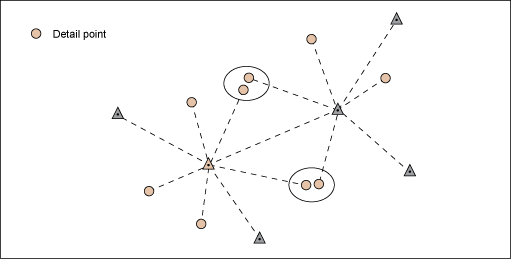In the fifth calculation step, you identify points that have been measured more than once. The approximation in the previous calculation step results in coordinates for each point. Usually, for identical points, these coordinates are slightly different.

For the adjustment, identical points have to be merged and introduced as one unknown.
The Find Identical Points function detects identical points by identifier, field code and location, as specified in the field code list. For points that exceed the tolerances, you are prompted to analyze the search results manually.
For example, if two points with different field codes lie within the tolerance, you would keep both points, if they represented two different real world objects. Then, they were both included in the adjustment calculation.
To find identical points
- In step 5, Find Identical Points, click Find.
- The identical points are merged. However, the following cases require that you decide how to proceed.
- Two points seem to be identical, but have different field codes. See Different Field Code
- Two points seem to be identical but do not lie within the tolerance. See Critical Identical Point
- After the search has finished, click the Show Coordinates link to analyze the search result. In the Coordinates dialog box, the Planimetry New Point tab, displays the new points that will be determined in the adjustment calculation in the next step.
To define or check the search rules for identical points
- In step 5, Find Identical Points, under Configuration, click the Manage Field Code list.
- In the Manage Field Code List dialog box, select the field code list.
- Under Field Code, click the Calculation tab. See also Settings to Find Identical Points.
If the results are all right, click Next to continue with step 7, Calculate Adjustment.
After step 5, Find Identical Points has been completed, you can introduce existing base points (fix points) as unknowns. See Moveable Points.
Step 6, Find Existing Points, is not part of the default workflow. Explicitly click the link on the Navigation pane to start this step optionally. Also, in the Global Settings, under Default Calculation Settings, you can add step 6 to the default workflow. See Global Survey Settings.
Calculation step 5, Find Identical Points, helps to detect measurement errors. For example, if you use unique identifiers for the points, the distance FS between two points that have the same identifier is calculated. If the distance exceeds the tolerance, the points are listed. See also Critical Identical Point.